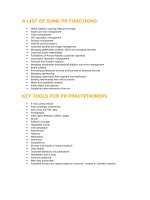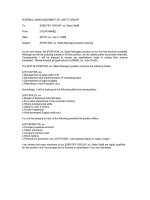What a year of job rejections taught me about pitching myself
Bạn đang xem bản rút gọn của tài liệu. Xem và tải ngay bản đầy đủ của tài liệu tại đây (1.1 MB, 5 trang )
CAREER PLANNING
What a Year of Job Rejections
Taught Me About Pitching
Myself
by Nina Mufleh
SEPTEMBER 09, 2015
After sending out hundreds of copies of my résumé to dozens of companies over the last
year, I realized that I was getting nowhere because my approach was wrong.
I did everything I was taught to do: I created a list of the top 20 companies I wanted to
work for, I customized my résumé for each opening, I networked online and offline. I met
some fantastic people throughout the process, but nothing got me closer to a securing a
role, or even a chance to interview.
What I had failed to do was ask myself some of the tough and honest questions early on.
My story began in May 2015 when after 10 years of building a successful career in the
Middle East, I decided to move to Silicon Valley to look for opportunities with tech
companies. I wanted to learn, and to be part of something big. I knew it would be a
challenge to restart my career in a new market, especially one that is densely populated
with talent, so I expected the process to take a few months.
As a few months turned into a year and I saw no signs of progress, I reached a point of
panic. Something felt wrong. Something was wrong. How was no one interested in
learning more about my background? How could a career that ranged from working with
royalty to Fortune 500 brands and startups not pique the curiosity of any hiring managers?
As a marketer, I decided to re-frame the challenge. Instead of thinking as a job applicant, I
had to think of myself as a product and identify ways to create demand around hiring me. I
applied everything I knew about marketing and storytelling to build a campaign that
would show Silicon Valley companies the kind of value I would bring to their teams.
The experiment was a report that I created for Airbnb that highlighted the promise and
potential of expanding to the Middle East, a market that I am extremely familiar with and
until recently they had not focused on. I spent a couple of days gathering data about the
tourism industry and the company’s current footprint in the market, and identified
strategic opportunities for them there.
I released the report on Twitter and copied Airbnb’s founders and leadership team. Behind
the scenes, I also shared it by email with many personal and professional contacts and
encouraged them to share it if they thought it was interesting — most did, as did some of
the top VCs, entrepreneurs and many peers around the world.
Within hours of releasing the report, a recruiter from Airbnb reached out to me to schedule
an interview. Within a few days, I had interviews with many of the area’s top tech
companies. And within a few weeks, I had identified an exciting role and have since joined
Upwork, an online platform that connects businesses with freelancers.
I was fortunate that the novelty of my approach — along with a little bit of luck and a lot of
social media strategy — got me on everyone’s radar. It opened all the doors that I had
dreamed of.
I figured that if I created something that inspired people and got a wide audience talking
about it, that would force talent scouters to take notice. That happened to the tune of
millions of social media impressions and global media coverage, but the lessons I took
away from it went beyond the power of a good marketing campaign.
What I realize in hindsight is probably one of the most important lessons of my career so
far. The project highlighted the qualities I wanted to show to recruiters; more importantly,
it also addressed one of the main weaknesses they saw in me.
In my case, having moved from Jordan to California, I was at a disadvantage. I didn’t have
a network of people that I had worked with in the past, people who knew my work and
would want to bring me onto their teams. The company I had co-founded there didn’t have
the recognition that it enjoyed throughout the Middle East either. I had only looked at
those shortcomings from my perspective until recently.
What I had failed to see was that from most recruiters’ perspectives, the market I was
coming from was irrelevant.
What the report helped me do was show, not tell, my value beyond their doubts. It
refocused my perceived weakness into a strength: an international perspective with the
promise of understanding and entering new markets. And though none of the roles that I
interviewed for in the last two months focused on expansion, by addressing and
challenging the weakness, I was able to re-frame the conversation around my strengths.
In almost all interviews candidates go through, there is the cliched question that is asked:
“What is your main weakness?” Most people are trained to answer that question by
thinking of a strength and packaging it as a weakness. As job-seekers, we tend to think of
what the person across the table wants to hear. If I’ve learned anything from this
experience, it’s that asking yourself a different version of that question is going to make
you better prepared for any conversation with a recruiter, a potential client, or even a
potential investor.
The question I should have been asking myself wasn’t “What is my weakness?” but rather
“What do they perceive as a weakness in my background?”
Had I asked myself that question and been honest with the answer earlier, I would have
realized the reason I wasn’t making any progress was not necessarily because of errors in
how I was applying, but in what I was communicating. Rather than focus on why I’d fit
into a top organization, I should have been telling them how I’d stand out.
Nina is a Freelancer Growth Manager at Upwork, an online talent platform for freelancers, where she works with
top freelancers around the world to establish and grow their careers online. She is passionate about building and
growing communities and is dedicated to global social impact.
This article is about CAREER PLANNING
FOL L OW T HIS T OPIC
Related Topics: J OB SEARCH |
Comments
Leave a Comment
P ROFESSIONAL TRANSITIONS |
TECHNOLOGY
P OST
4 COMMENTS
AL
3 hours ago
Freelance role at UpWork? Lol Hardly a 'dream job', didn't get the AirBnB job huh?
00
RE PLY
JOIN T HE CONVERSA T ION
POSTING GUIDELINES
We hope the conversations that take place on HBR.org will be energetic, constructive, and thought-provoking. To comment,
readers must sign in or register. And to ensure the quality of the discussion, our moderating team will review all comments and
may edit them for clarity, length, and relevance. Comments that are overly promotional, mean-spirited, or off-topic may be deleted
per the moderators' judgment. All postings become the property of Harvard Business Publishing.









